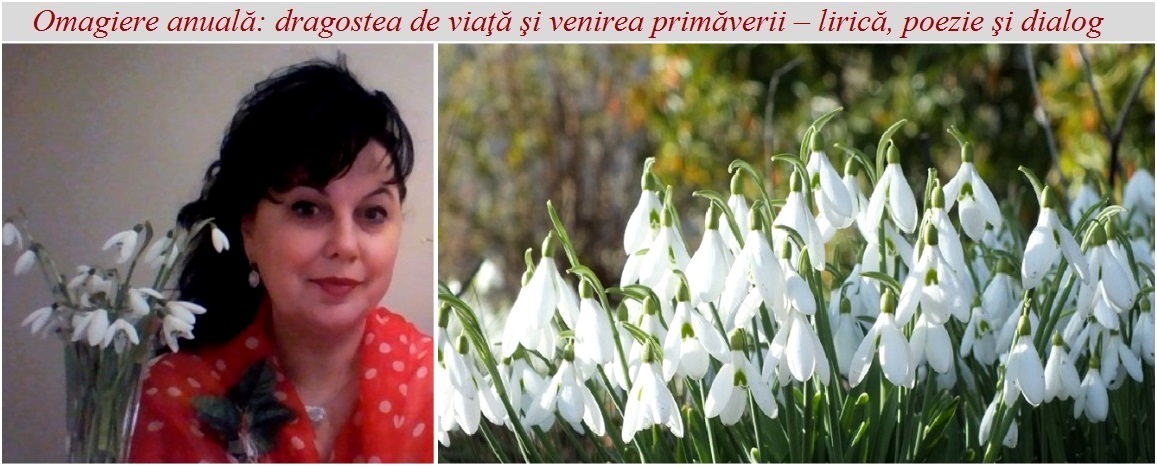~ Yearly Romanian literary evening featuring Valentine’s Day, “Dragobete” & “Mărțișor” ~

As I’m writing this note, I’m assuming that some people might
wonder why I keep emphasizing love, unity, peace, harmonious relationships,
mutual respect, ancestral tradition/s, society’s cultural facets, life’s artistic
perspectives, ageless wisdom, and so on, in a global consumerist world?!
Well, besides the fact that all these concepts are in perfect
alignment with the vision of our Circle, these are also the fundamental
principles of existence in itself.
We all have heard, time and time again, many scholars saying that
“tradition has been the foundation that gives meaning and purpose to our social
lives and serves as a guide to our beliefs, values and behaviours”, and many
disciplines (such as philosophy, history,
religion, art, literature and law) have it at the core.
At a very basic level, tradition, culture and identity are deeply interconnected.
At a very basic level, tradition, culture and identity are deeply interconnected.
On the other hand, culture and tradition help us better comprehend the world
around us, being a source of comfort which allow us to express our creativity.
By understanding other cultures, we learn to respect our differences and appreciate our similarities.
By understanding other cultures, we learn to respect our differences and appreciate our similarities.
All these being said, on Tuesday night, we’ve got the chance
to put some of these concepts in practice, joyfully giving and receiving
heartfelt perspectives.
It was a really beautiful experience!
It was a really beautiful experience!
Also, as a brief refresher, here are few background details
about the emphasized traditions:
- Valentine’s Day (February 14):
Nowadays, the Valentine's Day became an annual festival celebrating the romantic love, friendship and admiration. Every year, on February 14, people honor this day by sending messages of love and regard to partners, family and friends expressing their affection. This originated as a Christian feast day honoring one or two early Christian martyrs named Saint Valentine. - “Dragobete” (February 24):
While Valentine’s Day is mostly related to people (a well-known saint and those he helped) and their actions in the name of love,
“DRAGOBETE” is a very old and truly beautiful Romanian festive holiday associated with the arrival of spring as well as romantic love.
While no one really knows exactly when "Dragobete" started, it is believed to go way back to ancient Romania (aka "Dacian Kingdom").
In early myths, "Dragobete" is the son of “Baba Dochia” (in Romanian mythology, she is an old figure identified with the return of spring). He is the Romanian version of Cupid – bringing love and life with him. It is said that his magical presence could make the trees flower, insects, and birds to multiply and can turn men and women into lovers.
Celebrated each year on February 24th, this holiday is linked to the time of the year when birds build their nests and mate, being mostly connected with nature. As the first signs of spring begin to show, nature & man begin a new cycle of life and love. - “Mărțișor” (March 1)
The name “Mărțișor” (mərt͡siˈʃor) is the diminutive of “Marț”, the old folk name for March (“martie”, in modern Romanian language), & literally means "the little March". The actual “Mărțișor” is made of a small decorative object, tied to a white & red string, with two hanging tassels, which is offered customarily on the 1st day of March to girls, women & men (in some parts of the country) as it is believed that the wearer will stay strong & healthy throughout the entire year ahead. In the old times “Mărțișor” was regarded more as a protective talisman, but in modern days, & especially in the urban areas, most of its talisman properties got lost and “Mărțișor” became more of a symbol of friendship, love, appreciation & respect, as well as a symbol of the coming spring in addition to the snowdrop flowers.
NOTE:
In 2017, UNESCO decided to inscribe “Mărțișor“ on their list of Intangible Cultural Heritage of Humanity…please follow the links below for a more detailed reading about this significant gesture…thank you!
– ARTICLE: Romanian spring tradition included on UNESCO Intangible Cultural Heritage list
– ARTICLE: UNESCO adds Mărțișor to its ‘intangible cultural heritage of humanity’ list
Our
evening together was pleasing in every way, as each of my guests openly shared lots
of personal perspectives, emotions and priceless memories.
In my book of life, this gathering will add another page meant to fill my heart
with genuine gratitude!
Once again dear friends, many thanks to all those who honored my call! May your
spring be nice and fragrant!
Alice
“ In the end, it's not the years in your life that count; it's the life in your years.“ (Abraham Lincoln)





This event has been delivered in Romanian Language, featuring Romanian culture.
● Previous events I organized on the
same concepts: Love, Spring &“Mărțișor”– 2022, 2021, 2020, 2019
NOTE: Dear readers, please be advised that on this website each of the previous postings, pertaining to the recurrent annual themes, portray a different perspective of the subject/s presented (same theme/s, but a different outlook without duplication due to the cultural richness of the specific topic/s discussed).









